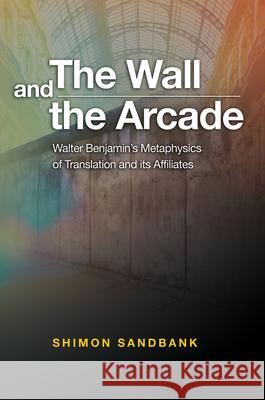The Wall and the Arcade: Walter Benjamins Metaphysics of Translation and its Affiliates » książka
The Wall and the Arcade: Walter Benjamins Metaphysics of Translation and its Affiliates
ISBN-13: 9781845199951 / Angielski / Miękka / 2019 / 112 str.
The Wall and the Arcade: Walter Benjamins Metaphysics of Translation and its Affiliates
ISBN-13: 9781845199951 / Angielski / Miękka / 2019 / 112 str.
(netto: 146,16 VAT: 5%)
Najniższa cena z 30 dni: 130,20 zł
ok. 30 dni roboczych
Bez gwarancji dostawy przed świętami
Darmowa dostawa!
True translation is transparent: it does not obscure the original, does not stand in its light, but rather allows pure language, as if strengthened by its own medium, to shine even more fully on the original. This is made possible primarily by conveying the syntax word-for-word; and this demonstrates that the word, not the sentence, is translations original element. For the sentence is the wall in front of the language of the original, and word-for-word rendering the arcade. (Walter Benjamin, The Translators Task) The book centers on Walter Benjamins revolutionary essay The Translators Task (1923) which subverts some widespread assumptions concerning translation: that it serves for communication, that it transfers meaning, that it must not distort the translators own language, and that it is inferior to the original. Benjamin overturns these assumptions by replacing the concept of translation as a merely linguistic operation with a metaphysical or theological concept of the same, derived from Jewish Kabbala and French Symbolisme. In The Translators Task, as well as his earlier essay On Language as such and the Language of Man, he delineates a cosmic linguistic cycle of descent from, and ascent back to, God. The translators task is to promote this ascent by deconstructing his own language in order to advance it towards a final Pure Language. Following an analysis of Benjamins approach, some of its affiliates are discussed in texts by Franz Rosenzweig, Paul Celan (as explicated by Peter Szondi) and Jacques Derrida. Rosenzweig, a translator like Benjamin, is shown to be concerned with more concrete aspects of translation, whereas Derridas autobiographical Monolingualism of the Other, though not focussing on translation, is shown to be an innovative contribution to the metaphysics of translation. Finally, an attempt is made to deal with the question of whether and how this abstract approach can be of help for the concrete practice of Poetry translation. The great poet Hoelderlins German translations of Sophocles testify to the clear, though elusive, practical contribution of this approach and to the importance of Benjamins legacy.











